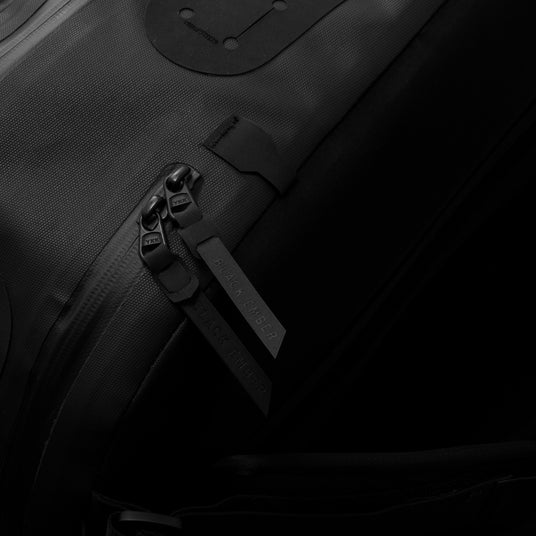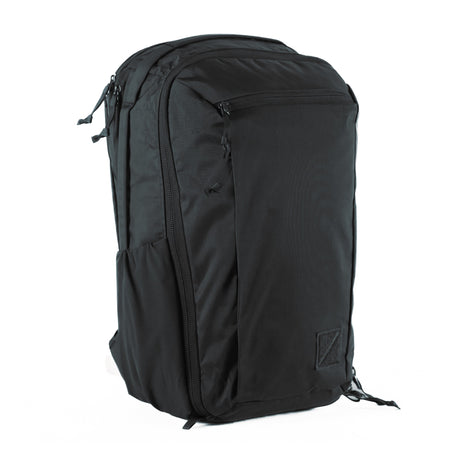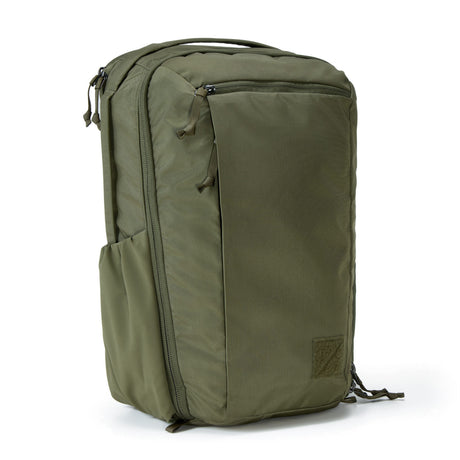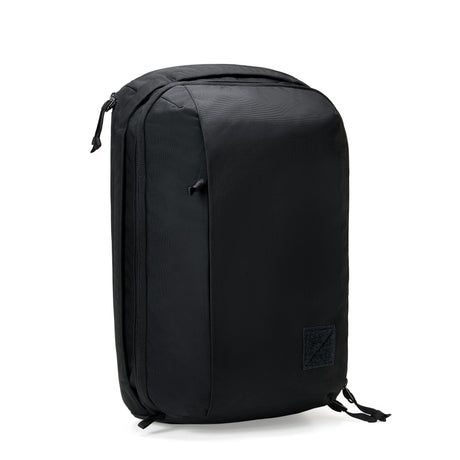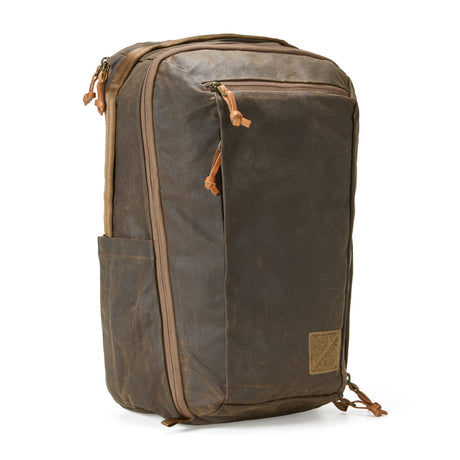Table of Contents:
Nylon
Nylon is the most common main fabric used in backpacks today. It's a whole family of polymers that can be melted down and into various fibres, which in turn can be woven and used for backpacks. The advantage of nylon is that it's strong, lightweight and water resistant. Listed below, the common terminology and types of nylon
Denier (D or d)
In simple terms, denier is metric used to describe the weight/thickness of the fiber yarn. Specifically, it tells you the mass of 9000 metres of a strand of the yarn. So when you see a bag with 450D fabric, 9000 metres of the yarn weighs 450 grams. Denier is based on a natural reference: a single strand of silk is approximately 1 denier - a 9000-meter strand of silk weighs about 1 gram.
Different denier fabrics are used depending on the purpose. Packable bags often require low denier (below 100) whereas heavy duty packs can range anything betweeen 800-1680D.
Thicker yarns have more fiber material in them, so as a general rule, higher deniers will yield higher abrasion resistance. However, other important factors such as fiber type, weave pattern and weave density also play an important role.
Ripstop Nylon
Ripstop nylon is woven fabric where reinforcement yarns are interwoven at regular intervals in a crosshatch pattern. This creates resistance to ripping, taring or unraveling if the nylon is punctured and also helps waterproofing. Ripstop is very common, particularly in outdoor backpacks. It's also used in sails, parachutes, and hot air balloons.
Ballistic Nylon
This is thick and durable nylon, originally developed by DuPont for military apparel during WW2. The name of this nylon speaks to its origin, as it was designed to protect the airmen from flying debris and fragmentation caused by bullet and artillery-shell impacts. Even thouhgh Kevlar has since replaced this function, ballistic nylon is still used today for many heavy duty backpacks. It is typically 840-1680 denier fabric. Ballistic nylon used to be a specific raw material, but is now more of a general describing term.
Recycled Nylon
Recycled nylon is made from post-industry waste from discarded nylon-based products. Despite this, recycled nylon has the same characteristics as regular nylon, including an excellent strength to weight ratio and durability. Recycled nylon uses less resources like water, energy and fossil fuels.
Cordura
Cordura is not technically a material, but it has become a brand name that's associated with high quality fabrics. Cordura fabrics are durable and resistant to abrasions, tears and scuffs. However, keep in mind that these days the tradename Cordura can legally be applied to any textile containing yarn produced by parent company Invista so they come out of mills all over the world. A label “1000d Cordura” narrows the field but doesn't identify a specific or singular textile.
X-Pac
X-Pac by Dimension-Polyant has multiple layers bonded together. Different properties in each layer provide specific benefits such as water resistance, structure, strength, and texture. The patented X-PLY® pattern helps reinforce the fabric at a 22-degree angle to give stability when used as a pack fabric. There are many different X-Pac fabrics such as VX21, VX41 and so on - the number on the model signifies the denier, e.g. VX21 is 210 Denier.
Cotton Canvas
Back in the days, most backpacks were made of cotton canvas, often coated with wax for waterproofing. Nylon and other synthetic materials have since taken over, but cotton canvas bags are still being made today. It's a natural fiber which often has environmental benefits and leaves less waste at the end of life cycle. Untreated cotton canvas is not waterproof and dries slowly, so cotton canvas packs are often coated and treated water resistat.
Organic Cotton
Organic cotton is grown without chemical pesticides, artificial fertilizers and genetically modified crops. It saves almost half of all Co2 produced when being grown in comparison to conventional cotton. If done properly, the growing and farming of organic cotton often contributes to the biodiversity and health of the ecosystems, as well as using less water and improving the quality of soil in the area.
Polyester
Polyester is probably the most commonly used backpack fabric after nylon. Compared to nylon, polyester is less expensive and has lower strenght-to-weight ratio. However, the fine thread can be woven with a higher thread count without increasing the thickness of the fabric, which can partially make up for the lower ratio. Polyester has great UV resistance, holds its colors well (the bag will look new longer) and doesn't absorb water. Polyester is highly recyclable and can be dyed using waterless methods.
Recycled Polyester
Recycled polyester is made from post-consumer waste like PET-bottles. The fabric gives new life to material that is not naturally biodegradable and could otherwise be harmful on the environment. The material is ground into chips, melted and spun into strong polyester fiber, then woven into fabric.
Polycotton
Polyester fibers are sometimes woven together with natural fibers such as cotton to produce material with blended properties. Cotton-polyester blends can be strong and resistant to wrinkles, tearing and shrinking.
Leather
Leather is a natural material often used in business and fashion oriented bags. It is not widely used material for backpacks due to its weight and low water resistance. However, when crafted from high quality leather such as vegetable tanned full grain leather, leather backpack can last a lifetime and developes beautiful patina, looking better with age.
Leather details such as panels, handles and zipper pulls are fairly common in fabric backpacks, which creates a nice, premium touch.
Hardware
A backpack is not defined by only its main fabric material. Hardware plays an important role especially when it comes to usability and longevity.
Fidlock buckles and fasteners
German made Fidlock buckles consist of magnetic fastener and mechanical snap. Strong magnets make the fasteners easy to close and secure snap ensures continuous high locking force. They are easy and quite fun to use. They close automatically and can be opened with just one hand, which makes them great fastener for a backpack or strap.
YKK zippers
You've probably seen the letters YKK in the zipper of your jeans or other clothes. YKK stands for "Yoshida Kōgyō Kabushiki gaisha" and it's the largest zipper manufacturer in the world. They control the whole manufacturing process from metal melting to packaging, which ensures the reliability YKK is known for. The range is wide from standard metal zippers to more specialty items such as water repellant zippers.
YKK AquaGuard zippers
When it comes to water resistance, zipper is normally one of the parts where moisture can enter into a backpack. AquaGuard by YKK stands for highly water-resistant and windproof zippers, which are suitable for rainwear and backpacks. The zippers are PU-coated to provide protection from the elements.
More terminology will be added!
